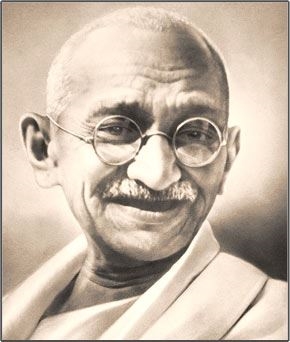 |
| Mahatma Gandhi (ghazwatulhind.wordpress.com) |
“We must become the change we wish to see in the world” (Gandhi). This insightful quote by Mahatma Gandhi has influenced many to take initiative and strive for change in a world of violence and discrimination. Destiny claimed Gandhi as an infant and would soon transform him into a legend of peace and good will that the world would come to remember forever. On October 2nd, 1869, the world was blessed with the birth of Mohandas Karamchand Gandhi. Born into a middle class family in Porbandar, India, Gandhi’s early life was restrained by the boundaries of Indian tradition. At the young age of 13, he married a girl named Kasturbai out of Indian tradition and fathered four sons. Four years later, he would go on to pursue his goal of becoming a lawyer by studying law in England. By 1893, Gandhi received his law degree from Inner Temple, London and accepted an offer to work for a law firm in Pretoria, South Africa. Gandhi knew that the British Empire ruled India and South Africa but he was oblivious to the racial prejudices and discrimination that engulfed the society. Gandhi had his first taste of the evils of discrimination when he was traveling first class on a train in Natal, South Africa. A white passenger was complaining of his presence on the train and the conductor had him forced off at the next station. When Gandhi refused to move to third class, he tried to reason with the conductor that he had always traveled first class. Gandhi’s innocence that night was valid; he had done nothing wrong. These cruel men had Gandhi forced off because he was Indian and they treated him like dirt for it. From then on Gandhi vowed to eliminate prejudice and strived for Indian independence. This crucial turning point in Gandhi’s life transformed him into the prime activist in the struggle for Indian independence that he is remembered for today. Gandhi continued his efforts in the struggle for Indian independence, becoming the president of the Indian National Congress in 1919. He worked toward improving the legal status of Indians and was christened Mahatma, which means “great soul,” by the people of India for his efforts. Gandhi achieved his goal of improving the legal status of Indians, which brought him to higher fame in the eyes of Indians everywhere. Gandhi exhausted all of his efforts to achieve his just cause and on August 15th, 1947, Gandhi’s prayers were answered when Great Britain finally granted India full independence. Gandhi regarded truth and nonviolence as his true moral values and never used violence to accomplish anything. He was the meaning of the word pacifist in the sense that he never used violence and was always peaceful no matter how much anguish he felt for those who opposed his just cause. Gandhi led a number of protests advocating his ideas of mass civil disobedience to the British Empire. He was arrested countless times and used his immeasurable courage to persevere through the hardships of prejudice that cast such a immense shadow over him. Mahatma Gandhi’s peaceful beliefs and tremendous courage proved that anyone can be the change they wish to see in the world.
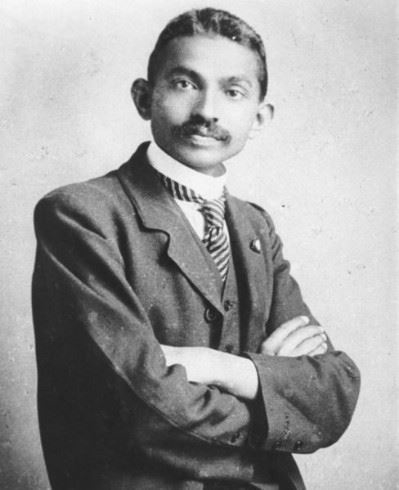 |
| Young Mohandas (desicolours.com) |
Mahatma Gandhi is remembered as the true definition and essence of peace. At the mere mention of peace, we visualize and remember Gandhi and his everlasting efforts to pacifically unite humanity. Mahatma Gandhi’s views of attaining peace came from his treasured moral values. He once said, “Peace will not come out of a clash of arms, but out of justice lived and done by unarmed nations in the face of odds” (Gandhi). Through Gandhi’s eyes, peace cannot be achieved through murder and violence; instead, it must be won by the good will of people who do not wish for death, but only for a just change. Gandhi believed in fighting for what he believed without violence and instead fighting with truth. He used mass civil disobedience and protests to fight for independence. One of Gandhi’s conflicts with the British Empire was the salt tax. This tax on salt had terrible effects on impoverished Indian peasants and Gandhi responded in protest: “In 1930 Gandhi began a famous 24-day "salt march" to the sea. Several thousand marchers walked 241 miles to the coast, where Gandhi picked up a handful of salt in defiance of the government” (Lebra). Gandhi led a protest march all the way to the sea to obtain free salt from the beaches, to show the government that the people of India would not pay Britain’s salt tax. Instead of organizing mass violent riots out of resentment for the taxes, Gandhi used peaceful tactics and protested without the use of violence. The heart of Mahatma Gandhi is one of a true hero. It is not a heart overflowing with the cruelties of violence, instead it is one that only knows peaceful ways.
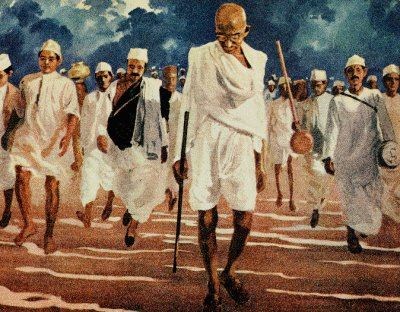 |
| Gandhi's Salt March (library.thinkquest.org) |
Few people in this world have the ability to harness their courage in the face of violence and adversity. Mahatma Gandhi was of this small minority. He was unafraid to stand up for what’s right and oppose something immoral that was bigger than him. His courageous spirit aided him in the struggle for Indian independence from Great Britain. Gandhi’s courage was reflected by his selfless actions and his efforts for peace. For example, after the climactic turning point in his life when he was faced with prejudice he “launched his campaign for improved legal status for Indians in South Africa, who at that time suffered the same discrimination as blacks” (Lebra). Gandhi possessed the courage to speak out and against immoral beliefs when others lacked the bravery to do so. He made everyone aware of the corrupt and prejudice society that took such a negative toll on Indians. In addition, when he stood up against Great Britain he knew of the risks involved. For instance, Gandhi organized the Salt March of 1930 in defiance to Britain’s salt tax and his “actions unleashed long pent-up emotions. Waves of protest and unrest swept across India and thousands were imprisoned. Gandhi himself was arrested in May of 1930” (Mohandas Gandhi (1869-1948)). Gandhi knew the risks of acting against Great Britain. He understood that the deck was not stacked in his favor and the consequences of his actions may lead to his demise. However, he had the courage to stay loyal to his values no matter what obstacle stood in his way. Gandhi took a stand for something he believed in with all his heart and did not back down at any costs.
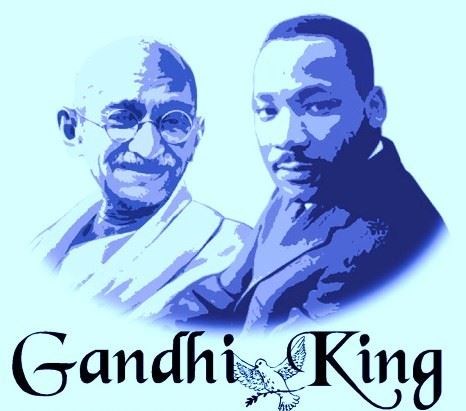 |
| Gandhi has influenced many heroes (atlpeace.org) |
Through his noble acts of peace and courage, Mahatma Gandhi became the change he wished to see in the world. Gandhi believed in nonviolence and used peaceful protest to show defiance to a prejudice society. He worked selflessly to defend the rights of Indian people and advocated civil disobedience to protest immoral laws forced on Indians. Gandhi used his endless love and courage to stand up for what is right. He used this courage to his advantage and overcame obstacles that in the past had seemed unachievable. Racial barriers were broken down because Gandhi had spoken out against discrimination when no one else would. Even with the odds against him, he had the courage to keep on pursuing righteousness, knowing the consequences that lay ahead. On August 15th, 1947 the British Empire granted India its full independence. Gandhi’s hard efforts had finally come through and he achieved the goal he had dreamed about for so long. Sadly, on January 30th, 1948 a bullet marked with hatred and violence ended Gandhi’s life. A Hindu extremist shot and killed the man who lived everyday of his life for peace and harmony. Gandhi died from the hatred he had been trying to relinquish ever since that one fateful day on the train. Gandhi has inspired me to never give up no matter what obstacle may stand in my way. His teachings convinced me that the impossible is truly possible. Since his death, Gandhi has influenced and inspired many individuals to fight for what is right. Martin Luther King Jr’s inspiration to fight for civil rights was in fact, Mahatma Gandhi. Gandhi’s teachings of peace will live on forever through the hearts and souls of anyone who wishes for change. Mahatma Gandhi’s name will echo through time as a shining example of true peace and courage.
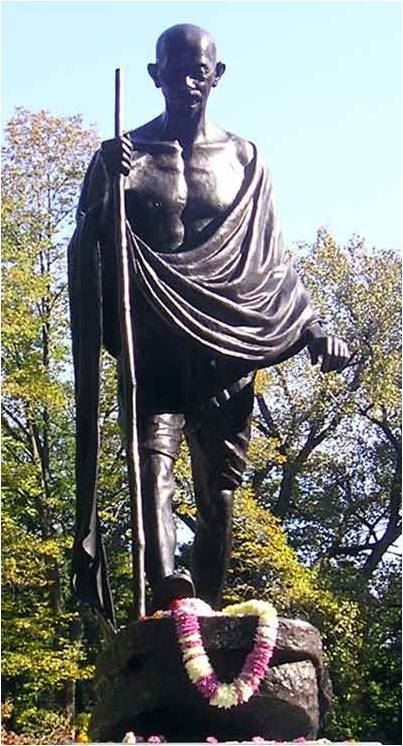 |
| Immortalizing Gandhi Statue (blog.cleveland.com) |
"Gandhi, Mohandas (1869-1948)." DISCovering Biography. Online ed. Detroit: Gale, 2003. Student Resource Center - Gold. Gale. DEL NORTE HIGH SCHOOL. 17 May. 2010
"Gandhi, Mohandas Karamchand (1869-1948)." DISCovering Authors. Online ed. Detroit: Gale, 2003. Student Resource Center - Gold. Gale. DEL NORTE HIGH SCHOOL. 17 May. 2010
"Gandhi, Mohandas (1869-1948)." UXL Biographies. Online ed. Detroit: UXL, 2003. Student Resource Center - Gold. Gale. DEL NORTE HIGH SCHOOL. 17 May. 2010
Lebra, Joyce. "Gandhi, Mohandas Karamchand (1869-1948)." Encyclopedia of World Biography. Ed. Suzanne M. Bourgoin. 2nd ed. Detroit: Gale Research, 1998. 17 vols.Student Resource Center - Gold. Gale. DEL NORTE HIGH SCHOOL. 17 May. 2010
Page created on 5/28/2010 12:00:00 AM
Last edited 5/28/2010 12:00:00 AM
